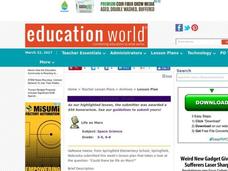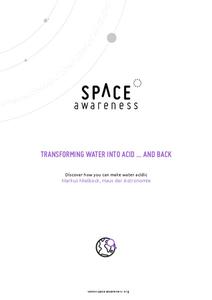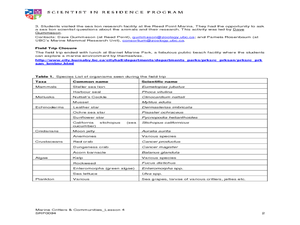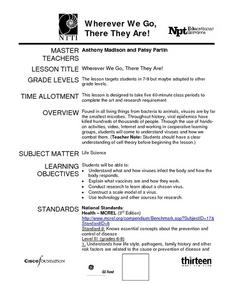Baylor College
Infectious Disease Case Study
Small groups of life science learners look at Allison's symptoms and discuss a diagnosis. They use a chart of illnesses and draw symptom clues from an envelope to determine what illness she has. A lesson like this gives children an...
Baylor College
Neural Network Signals
Using a simple circuit with the battery representing the brain, future physiologists test to see which solutions conduct electrical "nerve impulses." Enlighten learners with plentiful information on electric signals in the nervous system...
Baylor College
Crossing the Synaptic Gap
As part of a unit on the chemistry of the brain, thinkers learn how chemicals work to transmit messages between individual neurons and how controlled substances impact the synaptic cleft. They do so by playing a dice-and-card game in...
American Physiological Society
Hoo Eats Who and What is What in Your Own Backyard?
Bird is the word! Teach life science scholars the importance of our feathered friends and the roles they play in our ecosystem. Using the plan, learners investigate the birds in their areas, determine the biotic and abiotic factors that...
Curated OER
Life Science Investigation
Middle schoolers work to investigate an aspect of life science of interest to them from a list. Using the Internet, they research information and take notes on what to include in their presentation. They share their findings with the...
Curated OER
National Marine Sanctuaries Shipwrecks
Junior oceanographers access the Channel Islands National Marine Sanctuary Shipwreck Database and plot the locations of several shipwrecks. Shipwrecks are always an enthralling subject and this activity allows your learners to act as...
Curated OER
Life on Mars
Learners research the feasibility of life on Mars and debate what it would need in order to sustain life. They work in teams to predict, research, infer, and explain their theory using models they build.
Baylor College
Energy for Life (Energy from Food)
Energy comes in many forms, but how do living things get the energy they need to survive and thrive? In a simple, controlled experiment with yeast, water, and sugar, groups make observations about how yeast reacts with water alone, then...
Curated OER
Nature Superfish
Young scholars study the behavior or ocean animals called billfish. For this life science lesson, students create their own documentary about a local animal. They share their videos with the entire school.
Space Awareness
Transforming Water Into Acid ... And Back
Greenhouse gases affect marine wildlife in life-threatening ways. Through experimentation, your classes explore the acidification of water from the main greenhouse gas carbon dioxide. As they introduce carbon dioxide to water, a pH...
NOAA
Seafood and Human Health
Whether your young biologists realize it or not, humans play a significant role in marine ecosystems. To help them understand this fact children first create graphical representations that show homo sapiens' place in marine food chains,...
Curated OER
Marine Energy
In small groups, energy engineers research and make a topographic map of a marine natural resource. They report to the rest of the class pros and cons of extracting their assigned resource. The two activities may take up to four class...
Curated OER
What's in That Cake?
Cooperative groups research trip logs from deep-sea expeditions and explore characteristics of deepwater habitats. Using a cake as the ocean floor, they work together to decorate it as a model of such habitats. They also prepare a...
Curated OER
Where'd You Get Those Genes?
Really a unit, this resource exposes middle schoolers to genetics at their level. They read interviews and biographies, trace a family tree, play games that simulate inheritance concepts, and more! Teacher's procedures, student...
Curated OER
Tutti Frutti
Get some competition going in your life science class. Give lab groups a variety of plant parts, all of them fruits, except one. Their mission is to make observations, compare and contrast, in order to be the first to identify the...
Curated OER
TECH: Geneticist
A brief PowerPoint is used to introduce the class to the field of genetics by explaining the fields of work, the education required, and the job prospects. A trait inventory worksheet is completed by individuals, and then they gather...
Curated OER
Images of Science
Students discover that science is part of everyday life. In this science instructional activity, students create a science collage, draw a scientist, and write about science in the news.
Curated OER
Marine Critters and Communities
Students touch, see, smell, and hear marine animals that live in a marina. In this marine animals lesson plan, students take field trip to a marine environment after studying the animals.
Curated OER
This is Your Life
Middle or high-school pupils choose a scientist to research. They collect biographical information and explore their contributions to scientific understanding. With all that they compile, they create a scrapbook of the scientists' life....
Curated OER
Talking Trash - Marine Debris
Students bring in different trash items and define "marine debris" through a discussion about these items. They categorize debris and use statistics and graphing to better explain the types and amounts of marine debris found each yea
Sea World
Marine Animal Husbandry and Training
Step into the role of a zoo director with several activities about animal training and running a zoo. Kids calculate the amount of food each animal needs, design a habitat for penguins, decide how to breed bottlenose dolphins, and train...
NOAA
Deep-Sea Ecosystems – Life is Weird!
A pool of brine in the deep sea can be up to four times as salty as the surrounding sea water. The deep sea ecosystem relies on chemosynthesis and the organisms that live there are often strange to us. The lesson focuses on researching...
Curated OER
Design a Reef!
Using a miniature coral reef aquarium kit, young ecologists model this unique ecosystem. They research various coral reef organisms and their niches, and they culminate the project by working together to write a report. Use this activity...
Curated OER
Wherever We Go, There They Are!
The central video for this lesson is not available through the included resource link. However, the activity that simulates the passing of a virus through a population is impacting and the other resource links are invaluable. Use this...
Other popular searches
- 4th Grade Life Science
- Life Science Inquiry
- Life Science Vertebrates
- Life Science Experiments
- K 2 Life Science
- Life Science on Cells
- Life Science Lesson Plans
- Grade 4 Life Science
- Life Science Report Topic
- Australia Life Science
- The Life Science
- Life Science Lessons

























